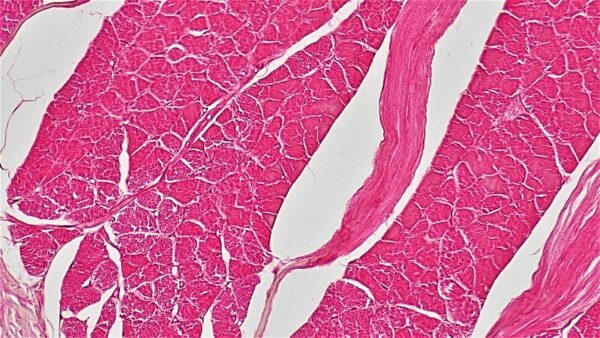
Sarepta Therapeutics is still assessing how best to prevent liver injury from its commercialized Duchenne muscular dystrophy gene therapy. But Sarepta partner Hansa Biopharma has encouraging preliminary data from a small clinical study suggesting its organ transplant rejection drug could find an additional use as a pretreatment option for Duchenne patients dosed with the gene therapy, Elevidys.
In three Duchenne patients who received one dose of the Hansa drug, imlifidase, the Lund, Sweden-based company reported a rapid reduction of immunoglobulin G (IgG) antibodies, which are antibodies that can drive excessive immune responses. Hansa said it will discuss with Sarepta the next steps for this program, currently in Phase 1 testing.
Elevidys is carried to muscle cells aboard an adeno-associated virus (AAV). These engineered viruses can prompt excessive immune responses, a known risk for genetic medicines that use AAV for delivery as a delivery vehicle. Immunosuppressive drugs are commonly administered as part of the regimen for gene therapies delivered by AAV.
Imlifidase works by degrading IgG antibodies. This drug, an engineered enzyme, is already commercialized in Europe under the brand name Idefirix, marketed for preventing rejection of a transplanted kidney. In this indication, the drug does not replace immunosuppressive therapy that patients must take following a transplant. Rather, the intravenously infused medication is used as a pretreatment for patients who have antibodies against the donor kidney.
The preliminary data reported late Friday come from a Phase 1 study with a targeted enrollment of six Duchenne patients who have pre-existing antibodies against AAV. Hansa said the results in three patients so far showed IgG reductions of 95% or greater compared to baseline levels. The reductions enabled these patients to receive Elevidys. Hansa said that 12 weeks after dosing of the gene therapy, patients showed evidence that the genetic material of the gene therapy was delivered to cells, which in turn led to production of micro-dystrophin, a smaller version of the dystrophin protein that Duchenne patients lack.
While production of micro-dystrophin is encouraging, Hansa noted that levels of this protein were lower than what was reported in other Elevidys clinical trials. As for safety, Hansa said the drug’s profile was consistent with prior experience and no new safety signals were observed. One adverse event of special interest from imlifidase’s organ transplant clinical trials was low levels of IgG that can lead patients to become more susceptible to infections. European regulators noted a higher frequency of severe or serious infections was reported in patients who received the study drug.
It’s been a whirlwind year so far for Sarepta and for Elevidys, which is the only FDA-approved gene therapy for Duchenne. The first fatality associated with this gene therapy was reported in March. After the second death in June, Sarepta said it would convene a committee of Duchenne and liver experts to discuss ways to mitigate the immune responses that lead to liver injury. Sarepta has said it will propose testing an already approved immunosuppressant, sirolimus, based on preclinical data. A third fatality emerged last month, this time in an adult clinical trial participant who received a different gene therapy for a type of limb-girdle muscular dystrophy.
The FDA initially asked Sarepta to stop shipping Elevidys for all Duchenne patients. Sarepta refused at first but then agreed to a voluntary pause. The agency last week told the company it may resume shipping the therapy for ambulatory patients, younger boys whose Duchenne is not as advanced and won’t require a higher dose that comes with a higher risk of adverse effects.
In a note sent to investors Monday, William Blair analyst Matt Phipps said the firm is glad to see proof of concept for imlifidase in Duchenne, but the lack of quantitative data makes it unclear about the next steps for the program. Imlifidase’s European approval was a conditional marketing authorization based on a thinner body of evidence. Phipps said investor focus is mainly on Phase 3 results of imlifidase in kidney transplants and the rare autoimmune kidney disorder anti-GBM disease, also called Goodpasture’s syndrome. Results from both studies are expected later this year. William Blair expects results will show statistically significant benefit in renal function versus standard of care measured at one year following administration of imlifidase.
Hansa’s partnership with Sarepta began in 2020, just prior to the imlifidase’s regulatory approval in Europe for preventing rejection of transplanted kidneys. Under the terms of the agreement, Sarepta will develop the enzyme drug as an Elevidys pretreatment in both Duchenne and limb girdle muscular dystrophies. Beyond the $10 million that Sarepta paid to Hansa up front, the Swedish company could receive up to $397.5 more tied to the achievement of milestones.
“We are encouraged that imlifidase was able to substantially reduce both IgG antibodies and pre-existing anti-AAV-antibodies to enable patients to be treated with gene therapy,” Hansa Biopharma CEO Renée Aguiar-Lucander said in a prepared statement. “We also look forward to reporting data from another ongoing gene therapy collaboration later this year, to continue to collect evidence of the potential benefits of imlifidase in gene therapy.”
Imlifidase is also currently in Phase 2 testing as a pretreatment for a gene therapy that another partner, Genethon, is developing for Crigler-Najjar syndrome, a rare inherited disorder in which the liver cannot break down bilirubin, a substance formed by red blood cells.
Public domain image by Flickr user Berkshire Community College Bioscience Image Library










